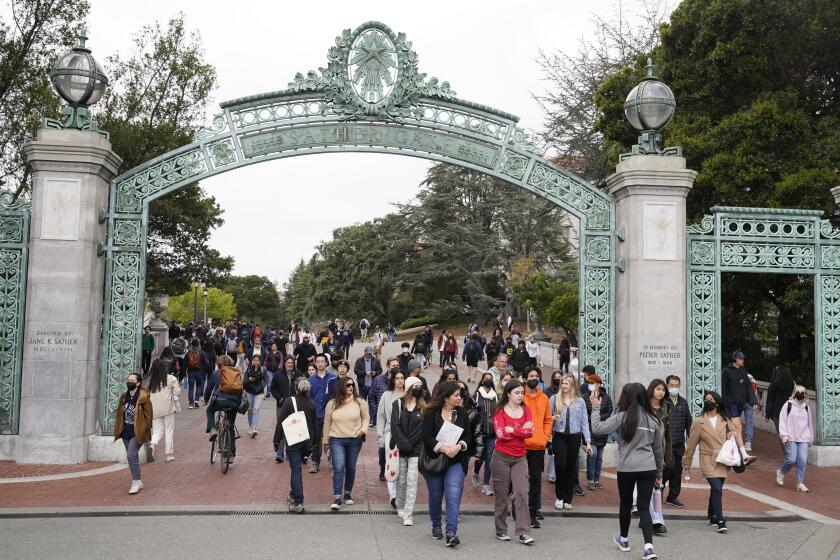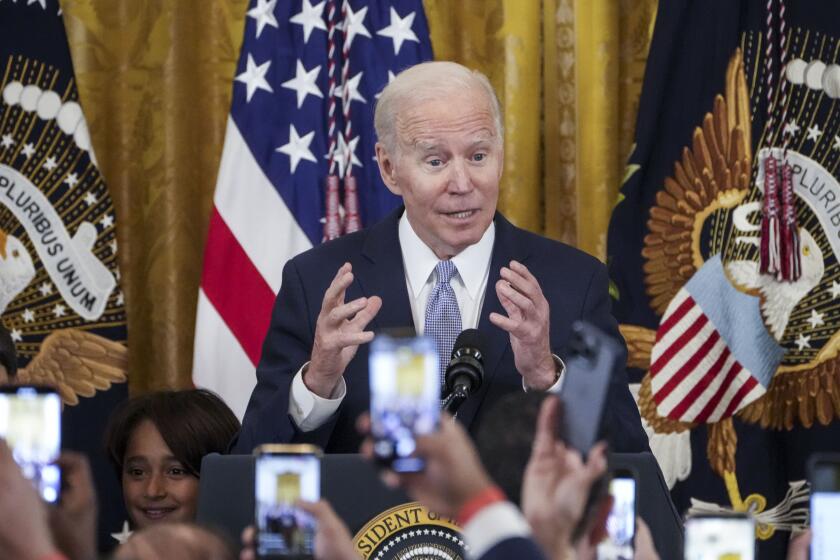Did you get a Pell Grant? Here’s how to tell

- Share via
The White House announcement about student loans on Wednesday included an unexpected boost for Pell Grant recipients: If their income is less than $125,000 (or $250,000 for a married couple), they’re eligible for twice as much loan forgiveness as other borrowers with similar incomes.
Although the relief isn’t large enough to wipe out the average borrower’s student loan debt, the $20,000 for Pell Grant recipients is certainly a bigger help than the $10,000 for other qualified borrowers.
The Federal Student Aid website was quickly overwhelmed by borrowers checking their accounts, many of them focused on a single question: “Did I get a Pell Grant?”
It’s not surprising that many people can’t remember all the pieces of help they received to pay for college: Student aid is the financial equivalent of L.A.’s Grand Central Market at lunchtime, a jumbled mass of options, tradeoffs and uncertain consequences. There is a panoply of scholarships, grants and public and private loans available to supplement whatever students and parents can afford to pay.
But answering the Pell Grant question is relatively simple.
The Biden administration’s student loan relief plan is expected to wipe out the debt of 1 million or more Californians. Here’s who is eligible and for how much forgiveness.
How to find out if you got a Pell Grant
No need to dig through boxes of old records — just log in to your account at the Federal Student Aid website. (If you don’t have an account, you can create one at the site’s Create an Account page. You’ll need your Social Security number and contact information.) There, you will find a graphic breaking down all the forms of aid you received.
It’s a good idea to log in (or create an account) regardless of whether you are curious about your history with Pell Grants, just to make sure the Education Department has your current contact information and that your payment record is accurate.
But good luck doing so today! The site continues to be overwhelmed by visitors checking their accounts.
The federal plan would forgive up to $20,000 in student loans for Pell Grant recipients and $10,000 for other borrowers earning less than $125,000 a year.
What is a Pell Grant anyway?
Pell Grants are a form of federal aid for lower-income students that does not have to be repaid, so it amounts to a straight-up discount on the cost of college. The money is awarded by schools to undergraduates who have not yet earned a bachelor’s or more advanced degree, and whose family cannot be expected to meet the costs of college without the help.
Unlike many forms of aid, there is no specific income limit or other financial factor determining whether you’ll receive a Pell Grant. Instead, the college looks at your Free Application for Federal Student Aid, which provides a detailed picture of your family’s income, assets and liabilities, to judge your Expected Family Contribution — that is, how much you and your parents (or just you, if you’re independent) can afford to cover through savings or loans. It compares that number to the cost of attendance, which includes tuition, fees, housing, food and books. If your family contribution can’t cover the cost of attendance, you’re eligible for a Pell Grant.
One of President Biden’s key promises on the campaign trail has been a long time coming. Who’s eligible? How will it work? Here’s what to know.
Some special circumstances can also qualify you for Pell Grants — for example, if you had a parent or guardian die while on active duty as a public safety officer or while in the military serving in Iraq or Afghanistan after 9/11.
Pell Grants are awarded on a sliding scale based on need, topping out at $6,895 for the 2022-23 school year. According to the Education Data Initiative, a little more than a third of undergraduates received Pell Grants, with half of the money flowing to students whose families earned less than $20,000. The average grant amount, EDI reported, was $4,491.
According to the Biden administration, an estimated 60% of Americans with student loan debt received Pell Grants. That means that more than half of the borrowers eligible for the loan forgiveness announced Wednesday will probably qualify for $20,000 in relief, not $10,000.
The name, by the way, comes from Sen. Claiborne Pell of Rhode Island, who championed the program.
About The Times Utility Journalism Team
This article is from The Times’ Utility Journalism Team. Our mission is to be essential to the lives of Southern Californians by publishing information that solves problems, answers questions and helps with decision making. We serve audiences in and around Los Angeles — including current Times subscribers and diverse communities that haven’t historically had their needs met by our coverage.
How can we be useful to you and your community? Email utility (at) latimes.com or one of our journalists: Jon Healey, Ada Tseng, Jessica Roy and Karen Garcia.
More to Read
Sign up for Essential California
The most important California stories and recommendations in your inbox every morning.
You may occasionally receive promotional content from the Los Angeles Times.














